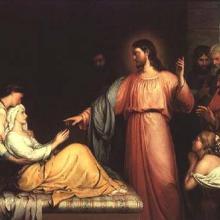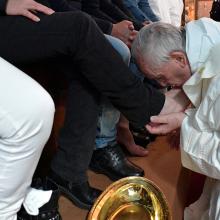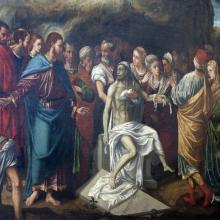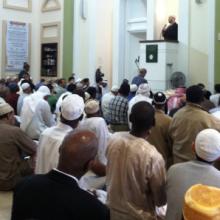sermon
Gabriel Salguero, president of the National Latino Evangelical Coalition, said the results show an increasing interest from everyday evangelicals — even urgency — to receive guidance on the issue from the pulpit. “More and more evangelicals are looking to scripture and what it has to say about the immigrant, the refugee, and the stranger,” he said. “Evangelicals want to move beyond just political talking points and be discipled on immigration reform.”
The following is an act of imagination. It is an attempt to fill in the gaps that are left for us in this story to bring the text to life. My hope is that this could be used as a resource for family Christmas Eve devotions or for congregations looking to creatively imagine the birth of Christ.
While it is still dark, Easter happens. Because if the message is that Easter only happens in the light, when we feel strong and certain, when suffering and death hasn’t touched our lives, when the powers of empire have been defeated and justice is consistently done — if that’s the only context where Easter happens, then our celebration of Easter would be a farce.
"We are all sinners. We all have defects," the pope told the inmates, in an improvised sermon broadcast by Vatican Radio.
By washing their feet, Francis told them, he was willing to do "the work of a slave in order to sow love among us". He urged them to help each other.
Two of the 12 are serving life sentences, and the others are due to be released between 2019 and 2073.
Screenshot via The White House / Youtube.com
“If Easter means anything it’s that you don’t have to be afraid,” President Obama said, to the scattered “amens” and grunts of agreement from the attendees of the White House’s Easter Prayer Breakfast on March 30.
Editor's Note: This post was originally a sermon in our monthly Sojourners chapel.
Friends, grace and peace to you from God our Father and the Lord Jesus Christ.
Around the time I started middle school, my church acquired a series of books called The Left Behind Series. These books chronicle the final days of earth as outlined in the book of Revelation and other apocalyptic biblical texts. I won’t offer any commentary on the theology of these books, or even their literary value, but, as a middle-schooler, they were fairly impressionable.
The entire series begins with a dramatic reinterpretation of the rapture. People are going about their daily lives — driving to work, flying airplanes, making breakfast — when all of a sudden, people who had been there just seconds before are gone. Simply vanished into thin air. Of course, chaos ensues, because who is driving the car? Flying the airplane? Tending the stove? The world they leave behind is shattered, broken, and chaotic! This seminal event — the rapture — shapes the rest of the series as those who have been “left behind” work to win the ultimate prize — a place in heaven where they are no longer left behind.
Editor's Note: This post is adapted from a sermon preached by the Rev. Dr. Randle R. (Rick) Nixon.
Some of us have stood at a tomb, faced an open grave, scattered the ashes of one beloved. We know what it’s like to be confronted with the stark reality of death and the flood of conflicting emotions that comes with it. I’ve stood at different sites at Dry Creek Cemetery in Boise, Idaho, and the Veteran’s Cemetery next to it, to bury my father, my brother, my nephew, my step-father and-step sister, my brother-in-law, not to mention my beloved piano teacher, and a dear high school friend. Not so long ago I stood by the open grave of Patrice Heath as her casket was lowered into the ground. We prayed and wept and celebrated her life, but it is not an easy thing, under any circumstances, to lay a loved one to rest.
The ancient story of Lazarus being raised from the dead in John 11:1-45 is just such a situation. It’s also another occasion to encounter Jesus in his divinity and his humanity. It’s a long, complicated story. You have heard it read. I will not attempt to unpack it all.
Turning part of the message over to church members is the concept behind a new worship model called WikiWorship.
Yes, that’s wiki as in Wikipedia.
The week before each WikiWorship, participants submit questions on religion, ethics, life, or God via the mission’s website. Then Chryst chooses one to spur discussion at each service.
It seems like an eternal winter here in Detroit. The Associated Press, citing a National Weather Service analysis, reports Detroit is experiencing the most extreme winter of any city in the country. I don't know about that, but this winter is "getting real up in here."
At Holy Redeemer, the church just north of Detroit where I serve as pastor, the weather has impacted 9 of 12 Sundays since Dec. 15. It's hindered our ability to gather for worship, dented budgets, and made it hard to maintain community.
You can set your watch by the storms that arrive late on Saturday night and clear by Sunday afternoon.
Yet, time and again the congregation at Holy Redeemer manages to surpass my wildest expectations of faithfulness.
Alexander was having a terrible, horrible, no good, very bad day.
It's a children's story. I know. A no good, very bad day ... how do you prepare your kids for that kind of day where nothing seems to go right, where at every turn knobs break and we step in puddles and get gum stuck in our hair?
Maybe, we tell ourselves, that we can move to Australia and everything will be better.
Well, no. Terrible, horrible, no good, very bad days happen there, too. They happen everywhere. Everywhere. It's a great book.
So what do we do about them? The classic children's book doesn't answer the question for us. Not really. It's just a little bit of truth telling with fun illustrations. Some days are just terrible, horrible, no good, very bad days.
But as we grow older, we learn that though these days do simply happen, that there are attitudes one can have, there are approaches to these days one can take.
In their holiday Eid al-Fitr khutbas, or sermons, on Thursday many imams across the country noted a growing climate of acceptance in America but urged Muslims not to forget the problems facing their communities in the U.S. and overseas.
“The Eid khutba is like the State of the Union address,” said Oklahoma-born convert Suhaib Webb, imam of the Islamic Society of Boston Cultural Center, the biggest mosque in New England, to an overflowing crowd — men dressed in crisp robes, tunics, and three-piece suits, women in black abayas, long floral wraps, and colorful headscarves.
“Our community is at a unique crossroads,” Webb said, issuing a call for older Muslim generations to allow younger generations to have greater roles in community affairs. “There are a lot of young people with a lot of excitement, and a lot of old people with a lot of fear. And that’s not a healthy thing.”
Every three years, the assigned readings during the summer include five weeks of working our way through the Gopel of John, chapter 6, and what is called the "Bread of Life Discourse." And let’s just say that if Trey Parker and Matt Stone wrote a musical called The Book of John they’d have plenty of material from just this chapter alone.
In the last five weeks we’ve gone from the feeding of the 5,000 to Jesus walking on water in the middle of a storm at sea — by the way, Jesus walks on water during a storm at sea so often in the gospels that I’ve started thinking it was less about being miraculous and more about just getting in some cardio — anyhow, the crowd chased him down, demanding more bread, and then he goes and says that he is the Bread of Life come down from heaven (which angered the nice religious folks), and rather than backing off, he makes it even weirder by saying whoever eats his flesh and drinks his blood has eternal life.
Which is where we pick up today when some of his disciples are like, “Uh Jesus, that teaching is HARD…who can accept it?” And many of them leave. And I have to say, I don’t really blame them.
This teaching IS hard. But honestly, Jesus had a lot of sayings that were HARD. Sayings such as, " Love your enemies and pray for those who persecute you," "You who are without sin cast the first stone," "Sell all you have and give it to the poor," "The first shall be last and the last shall be first," and "If you seek to save your life you will lose it."
I totally understand the reaction of these disciples who say these teachings are hard, who can accept them?
But this week I started to wonder if maybe those disciples didn’t have to leave Jesus … I mean, when we make the accepting of hard teachings the litmus test for being a follower of Jesus, I wonder if we are perhaps missing the point altogether.
I want to point out three things, regarding Paul's analogy of the fruit of the Spirit.
1. It's not something we can acquire by simply trying harder. Throughout Galatians, Paul dismantles the idea that all God wants is for us to try harder, to do more things, to count on our achievements to gain right standing with God. The fruit of the Spirit comes when the Spirit is living in us.
To state the obvious: if you want an apple, you grow it. You plant the seed, you water it, you care for it, you allow for whatever factors you have no control over — weather, for example — and you trust and hope that, in the right time, the tree will spring up, it will blossom, and it will bear the fruit you’re looking for. It takes time and effort, and even then, we have no guarantee of what, where, when, or how something is going to appear.
Have you ever heard someone pray for patience now? It kind of misses the point of what patience is, doesn’t it? I definitely think we should be praying for these things, but don’t expect them to be just placed in your lap — “Here’s the love for your neighbor you requested!" Absolutely, there are times when God pours out a supernatural measure of peace or joy on us, but more often than not, instead of just giving us those things, God gives us opportunities to learn those things — love, joy, gentleness — and he gives us his Holy Spirit to be with us at all times, including those times, and the Spirit brings peace and joy in the midst of those things, so thatwe can cultivate the life framework to sustain it all, to grow a healthy soul, where we learn how to weave body, mind, and spirit into one cohesive whole.
 On the road?
On the road?
Under the weather?
O could you just not get yourself together to make it to church this weekend?
Bless your heart. We've got you covered.
Here for you edification and instruction, are three good lessons in video and audio form, from pastors Tripp Hudgins, Jeff Tacklind and Grace Imathiu ... inside the blog.

"Agape." Image by Marcelino Rapayla Jr./Wylio (http://bit.ly/JeNyaP).
This week I got an email from my friend Pastor Jodi Houge of The Humble Walk church in St Paul. Amy Hanson had emailed her asking if, when she’s at Luther, Amy could do her field ed placement at Humble Walk. So afterward when Jodi emailed me she said Oh my gosh thanks for sending Amy our way, I love her already. Jodi loves Amy Hanson already but not because of Amy Hanson’s winning personality, position or portfolio. Jodi Houge does not love Amy Hanson because Jodi’s so nice and has a big heart. Pastor Jodi loves Amy Hanson already based solely on the fact that Amy Hanson is loved by us. Based on the fact that Amy Hanson is our friend she will have an honored place at Humble Walk church in St Paul Minnesota.
In our Gospel text from today Jesus says to abide in his love, to love one another and then he calls his disciples friends. But the Bible tells us that he had other friends too. Mary, Martha and Lazarus of Bethany were Jesus’ friends. He like, totally hung out their house all the time – they stocked his favorite beer in the fridge. And when Lazarus died, Jesus stood at the tomb of his dead friend and wept. These were Jesus friends. And since at our Big Fat Church Meeting after liturgy today we are going to talk about things like sacred hospitality, I started to wonder what kind of hospitality 3 strangers who came to our church might receive if we found out that those 3 strangers were actually Mary Martha and Lazarus. If we knew that the people entering the doors of this, our little House for all Sinners and Saints, were actually Jesus’ friends, that they were those whom Jesus loved then despite what we thought of their personalities, despite how we felt about them or their status in society or their politics, despite any of this they would automatically have an honored place, right?
We would, as Jodi does Amy, already love them not based on how we felt about them, but we would love them with the love Jesus speaks of in our gospel text for today… which in Greek is called agape love.
Most every Sunday Ruth or Lily Janousek hands me a drawing on the way out the door. I have quite a collection.
Lily and Ruth are budding theologians. They may not know that about themselves, but that’s what they are: budding theologians — they do theology. They do their best to speak of God.
They draw pictures of God and us. Like the one from last Sunday — a drawing of a bouquet with the words:
“God doesn’t love us as a flower but as a bouquet.”
Dear HFASS,
How are you? I am fine.
Actually that’s not true.
See, I wrote another sermon this week. A real one. I worked on it all week. And then yesterday afternoon I threw it away and just wrote you this letter instead. Because I realized that in my sermon I was trying really hard to convince you of something.

"Christ Healing the Mother of Simon-Peter" by John Bridges. Via Wiki Commons, http://bit.ly/zTeWKC.
That famous yet fictional saint of the church, Homer Simpson once said Well, I may not know much about God, but I have to say we built a pretty nice cage for Him.
So, we’ve been slowly making our way through Mark’s Gospel since December and our reading for today starts exactly 26 verses into the book. Here’s a little re-cap to catch you up to speed: The Beginning of the Good news of Jesus Christ. John the Baptist appears in the wilderness with his questionable wardrobe and dietary choices and baptizes Jesus. Heavens torn open. This is my beloved. For which Jesus is rewarded with 40 days in the wilderness with the wild beasts and angels. Repent and believe the good news of the kingdom.
On his way to Capernum he picks up some stinky fishermen.
Then on the Sabbath he’s teaching in the synagogue – and everyone’s like “wow. That Jesus isn’t totally full of it like the other guys” Finally he casts out an unclean spirit after commanding it to shut the hell up.
And that’s pretty much where we pick up the story today.

Pulpit of St. Mary le Tower parish in Ipswich, UK. Via Wylio http://bit.ly/wTWgaL
Did you hear a particularly good sermon, homily, teaching, preaching, lesson or message this Sunday?
We'd love it if you'd share it with us.
Please email Cathleen (cfalsani@sojo.net) with links to audio, video or text versions of the message you heard, and we'll share the best of the best with the rest here on God's Politics.













